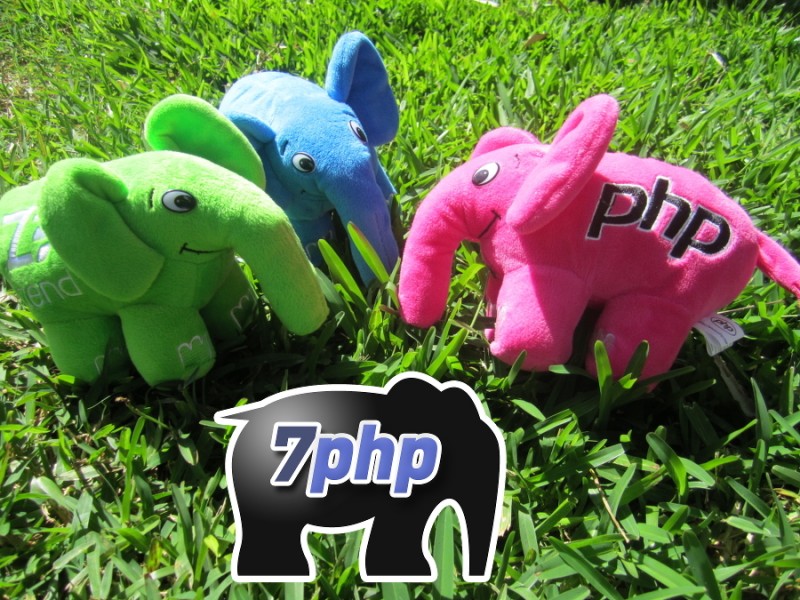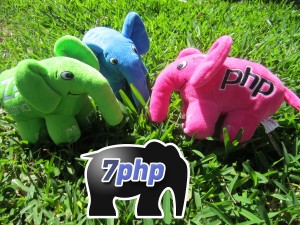At the middle of November my wife and myself were speaking about the Advent calendar for the kids. And I came to realize that I missed the phpadvent/webadvent the last years. And wouldn’t it be great to have a read about something PHP-related for the first 24 Days in December? Even for those people that are not christian the time before christmas has to be a special time. And if it’s only due to the commercials and ads what to present.
So I would wait and see whether someone would arrange something.
But wait! When everyone thinks someone should do something, no-one will do anything.
Cal Evans words came into my mind: If there’s no usergroup around, you’re the leader of the new usergroup. So I decided to just try it. Ask a few people I knew of twitter whether they would like to write something about the PHP-Community at large and get that published for those first 24 Days in December.
That first step was one of the hardest parts of the whole project. Realising that “The Community” starts with myself and – even though I might not realize it – I am a vital part of it. It’s a constant give and take and this is my way to give. There is no central authority to be asked whether I am allowed to do such a thing. Just do it and the community will decide whether it’s OK or not. And You’d be surprised how often it’s more than OK!
It was still 12 Days before December 12th. So I registered the domain with one of my providers I had good relationships with and started to make a list of people I’d like to ask for contributions. I wanted to have a good mix of people showing the broad diversity of the community and the language. People from different continents, different frameworks, different usergroups, different gender, different religion, different popularity and so on.
With that set I started to look through people I knew – and if only remotely – to find at least 24 to ask. I realized I should ask a few more people in case some wouldn’t want or be able to contribute. So in the end I had a list of 33 names I wanted to contact. It was totally clear to me that this list in no way was a good resemblance of those targets I set myself, but it was the best I could do at that short notice.
The next interesting thing then was to contact those people. For most of them I found an Email-Address on the internet, others I could contact via twitter. Some I could only contact via meetups contact-form (which seems to be rather lousy as I never got a reply from them). And then I reached out to ask whether they wanted to contribute. Now there was no way back!
I actually didn’t have a complete list when I started contacting the first people. I had about 15 to 20 names and decided to start of from that and see how it goes along from there. And during the following days I found more names by checking usergroup-leaders, people that tweeted community-stuff and so on. And suddenly the list was complete.
After sending my mail I was overwhelmed by the responses!
Apart from less than a handfull of people I got replies from everyone. Sadly a few rejection but I could understand them and it made my planning much easier. Most of the replies though where along the lines of “Great Idea! How much text?/What exact topic?/You sure I’m the right person?”
Some of the people I contacted didn’t consider themselves as part of the PHP-Community and weren’t sure they “qualified” to write about the community. All of them influence their specific framework-centric community in one or another way and that in turn influences the whole PHP-Community at large. So YES, they qualify!
Fine, everything settled. I made schedule of who should contribute at what date with no real strategy behind besides – at the beginning – first in first out. The website was set as well so I created logins for the 24 remaining people, created 24 posts, assigned the authors and hoped that everything was set now. I could not have been more wrong.
Some people couldn’t make their dates due to various understandable reasons they explained well in advance to me. So I had to find someone to swap the date with. More than once I had to write an “apologies but would it be possible for you to contribute earlier”-email. And not a single time I got a negative response! It was awesome! It was like I started to learn thanks to Stefan Koopmanschap – If you ask for something, the worst thing that might happen is a “No”. But without asking you won’t get anything.
That was the easy parts. Then there have been those that made their contribution at the very last minute (or sometimes even after that). At the beginning it caused me a sleepless night when I didn’t see the contribution before I went to bed (some three hours before the post was autopublished). But after one or another encounter with that and the realisation that the earth was still turning I put that of. The worst that might happen is that the post would be published later than expected. I think that only happend twice and no one complained about it.
And then there was the 22nd of December. The contribution wasn’t in on-time. And I was still waiting. And I hadn’t heard an answer to my “short-reminder” emails I sent everyone to remind them of the date and time. And I didn’t have an ace up the sleeve. So I had to admit there would be no post today.
And again Stefan saved the day. He simply asked! And within no time I had two more contributions in my inbox and one asking what to write. Awesome! The community worked again! (And – of course: Asking!) Why hadn’t I asked instead of apologized? There is so much still to learn!
Unfortunately at the time those emails came in I was already in bed high with fever. Flu struck! Thanks to modern medicine I could find a way to manage email, convert one of those contributions into a blog-post publish and fall back to sleep. And the last two days went extremely easy from an organizing point of view.
In the end this project was an awesome experience for me. I learned a lot about the community I so much favour and about that so much fantastic words have been written during the last days. I learned that asking is easy and often rewarded. I learned that different people work differently but when they have a common goal do their best to achieve it – it might not be my way but it’s their way of doing it.
And I learned that the PHP-Community is much broader and diverse than I expected. And I learned that it will not have been the last time I asked people to write something during the end of the year.
Thank you to all those people that contributed. Thanks to all those that told me they wouldn’t have the time to contribute. And Thank You to all those spreading the word about this project and to all readers!
And as all this would have been pointless and impossible – last but not least –
Thank You Community!


